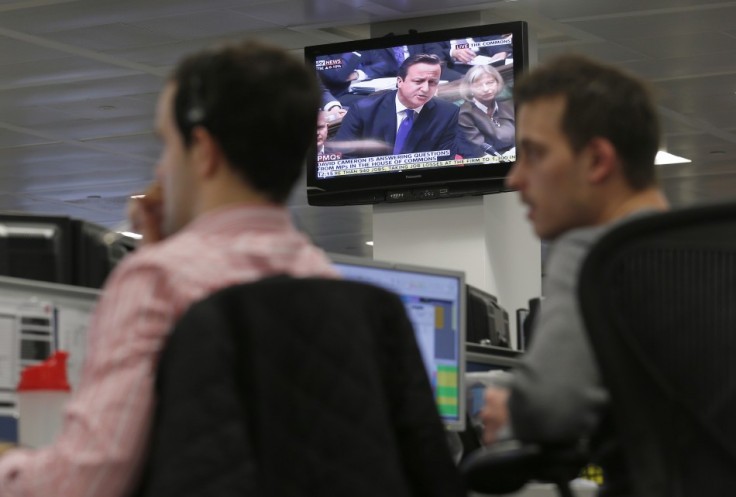Cameron EU Referendum Pledge: Don't Be Sure of all this 'Uncertainty'

Few words carry more resonance in economic reporting than "uncertainty". Investors hate it and consumers fear it, we're told, while markets crave decisiveness and punish those who can't deliver it.
The "U" card was played fast and loose Wednesday after Prime Minister David Cameron finally made public his poorly-hidden pledge to call a UK referendum on Britain's membership within the European Union.
The UK now faces "years and years of uncertainty" said Cameron's coalition partner Nick Clegg. That's "not in the national interest because it hits growth and jobs".
Sir Martin Sorrel, who heads WPP, the world's largest advertising group, told Channel 4's Faisal Islam that putting the question to the British people "does create uncertainty".
"It's a nightmare," Labour MEP Richard Howitt warned the BBC. "Of uncertainty"
I'm not so sure.
Britain's relationship with Europe has been essentially the same since the early 1990s with various making lightly-defined pledges on referenda followed by vows to renegotiate specific terms based on domestic political support.
Former Prime Minister Tony Blair - a committed Europhile - said the "big reality" Europe faces after French and Dutch voters rejected the EU Constitution in 2005 was that national parliaments needed more power and the European Commission needed its wings clipped.
Correct me if I'm wrong, but that's not a million miles from what the supposedly Eurosceptic Cameron has suggested today.
Blair himself had called for an EU referendum in 2004 - promising in Parliament to "let the people have a final say ... once and for all".
He didn't set a date. He didn't set parameters. He didn't say it would be binding.
He reversed his position four year later.
Still, the economy somehow managed to grow at an average pace of 2.5 percent during those four years of "uncertainty" and foreign direct investment peaked at an all-time high of £196bn in 2007.
Britain in Europe Redux
I'm not suggesting for a moment that Britain's economy is going to match that kind of pre-crisis pace, but its problems are significantly deeper and far more challenging than the current "Britain in Europe Redux" debate that seems to run on an infinite loop in the mainstream media zeitgeist.
Investors have lived with that uncertainty for the better part of three decades. At the moment, they're dealing with an existential uncertainty that defines the Eurozone itself.
They could care less if Cameron repatriates the right to set working hours for NHS doctors or wins the freedom to opt out of the European Arrest Warrant.
Capital will flow where it can generate the highest returns, irrespective of politics.
If investors gave a fig otherwise they wouldn't be tripping over each other to gain access to China's consumers or Russia's oil.
The saddest and *most* certain aspect of the entire debate is that Britain's leaders - and their opposite numbers in Europe - seem far keener on "settling" their political relationship than their bewildered electorate, who at present are perhaps a bit more concerned with the trivial life: finding or keeping a job and raising and feeding their families.
European voters may continue to elect leaders who support the drive to ever closer political union, but that doesn't mean they endorse that portion of the project.
In fact, the opposite is true.
The economic ties that have bound Europe thus far are infinitely more powerful than the political union its leaders want to pursue. And while the EU embrace might be democratically suffocating, it pays the bills.
European voters are terrified that domestic recessions - which, incorrectly or not, they feel are the result of decisions taken in Brussels - will last decades rather than years if not for the deep pockets and printing presses of Frankfurt.
Can't love it, Can't leave it
The confusion of Greece's spring and summer elections emphatically proved that point: effigies of Angela Merkel were burned alongside German flags only weeks after many of the same people chose to elect a government that told them, in no uncertain terms, that Greece wouldn't exists without its Teutonic lifeline.
There's a portion of truth in that logic - and one which should recognize the incontrovertible power of the EU as an economic bloc.
Flawed as it may be the collective effort to create a mini-laboratory for globalisation from the Baltics to Barcelona has been a stunning half-century success: millions of jobs, decades of peace, increasing equality.
Accomplishments not to be dismissed and rarely - if ever - replicated in the wider world.
Looking at this through the short-sighted prism of the past two years, however, has created the dangerous myth that unbridled capitalism and free-market largesse came within days of destroying that legacy and that its inner demons can only be tamed by benign and patient technocrats.
Both summations exaggerate the truth, but the fact that voters appear to be endorsing the latter doesn't mean they buy into the former.
Jobs and prosperity they care about. German influence in Spanish affairs they can do without.
Britons, for reasons of both logic and emotion, have consistently shown a mildly suspicious - but broadly ambivalent - attitude to Europe's core political beliefs. There's precious little appetite, however, to putting the relationship with their biggest export customer at risk.
The obvious commonality of the two positions is now at risk of being torn apart at exactly the time when both economies need it the most.
Why Europe Should Give Cameron What Britain Wants: A Continental View
© Copyright IBTimes 2024. All rights reserved.





